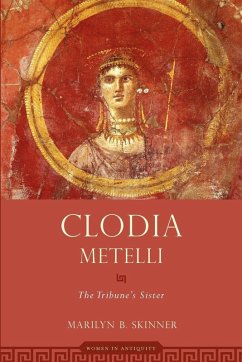Clodia Metelli: The Tribune's Sister is the first full-length biography of a Roman aristocrat whose colorful life, as described by her contemporaries, has inspired numerous modern works of popular fiction, art, and poetry. Clodia, widow of the consul Metellus Celer, was one of several prominent females who made a mark on history during the last decades of the Roman Republic. As the eldest sister of the populist demagogue P. Clodius Pulcher, she used her wealth and position to advance her brother's political goals. For that she was brutally reviled by Clodius' enemy, the orator M. Tullius Cicero, in a speech painting her as a scheming, debauched whore. Clodia may also have been the alluring mistress celebrated in the love poetry of Catullus, whom he calls "Lesbia" in homage to Sappho and depicts as beautiful, witty, but also false and corrupt. From Cicero's letters, finally, we receive glimpses of a very different woman, a great lady at her leisure. This study examines Clodia in the contexts of her family background, the societal expectations for a woman of her rank, and the turbulent political climate in which she operated. It weighs the value of the several kinds of testimony about her and attempts to extract a picture as faithful to historical truth as possible. The manner in which Clodia was represented in writings of the period, and the motives of their authors in portraying her as they did, together shed considerable light on the role played by female figures in Roman fiction and historiography.
Hinweis: Dieser Artikel kann nur an eine deutsche Lieferadresse ausgeliefert werden.
Hinweis: Dieser Artikel kann nur an eine deutsche Lieferadresse ausgeliefert werden.








